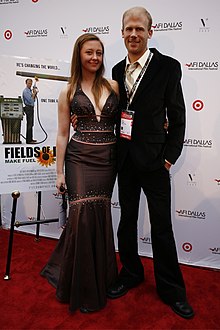Rebecca Harrell Tickell
| Rebecca Harrell Tickell | |
|---|---|

Rebecca Harrell Tickell with husband Josh at AFI Dallas Film Festival, March 2010
|
|
| Born |
Rebecca Reynolds Harrell March 2, 1980 Lancaster, Ohio |
| Occupation | Filmmaker Environmental Activist Actress |
| Years active | 1989–present |
| Spouse(s) | Josh Tickell (2010–present) |
| Website |
bigpictureranch |
Rebecca Reynolds Harrell Tickell (born 2 March 1980) is a producer, director, actress, singer and environmental activist.
Harrell Tickell had a starring role in the Christmas film Prancer. She garnered a nomination for a Young Artist Award for Best Young Actress Starring in a Motion Picture. Movie critic Roger Ebert highlighted Harrell Tickell's performance, saying "what really redeems the movie, taking it out of the category of kiddie picture and giving it a heart and gumption, is the performance by a young actress named Rebecca Harrell, as Jessica. She's something. She has a troublemaker's look in her eye, and a round, pixie face that's filled with mischief. And she's smart—a plucky schemer who figures out things for herself and isn't afraid to act on her convictions".
Harrell Tickell appeared in other films before putting her acting career aside to focus on environmental activism. Harrell Tickell has been interviewed on the Today show, by The New York Times, the Los Angeles Times, and The Washington Post.
In 2010, with husband Josh Tickell, Harrell Tickell documented the BP Oil Spill disaster in the Gulf of Mexico for their film The Big Fix. The Big Fix premiered as an 'Official Selection' at the 2011 Cannes Film Festival. Harrell Tickell became sick during the making of this film due to exposure to the mixture of oil and Corexit which resulted in an irreversible skin condition. The film received positive reviews, earning an 86% rating on the Rotten Tomatoes website.The New York Times compared the film to Silkwood and described the The Big Fix as "an enraged exposé of the crimes of Big Oil".The Village Voice wrote “The film’s scope is staggering, including its detailed outlining of BP’s origins and fingerprints across decades of unrest in Iran. By doing smart, covert reporting that shames our news media, by interviewing uncensored journalists, by speaking with locals whose health has been destroyed, and by interviewing scientists who haven’t been bought by BP (many have, as the film illustrates), Fix stretches into a mandatory-viewing critique of widespread government corruption".
...
Wikipedia
